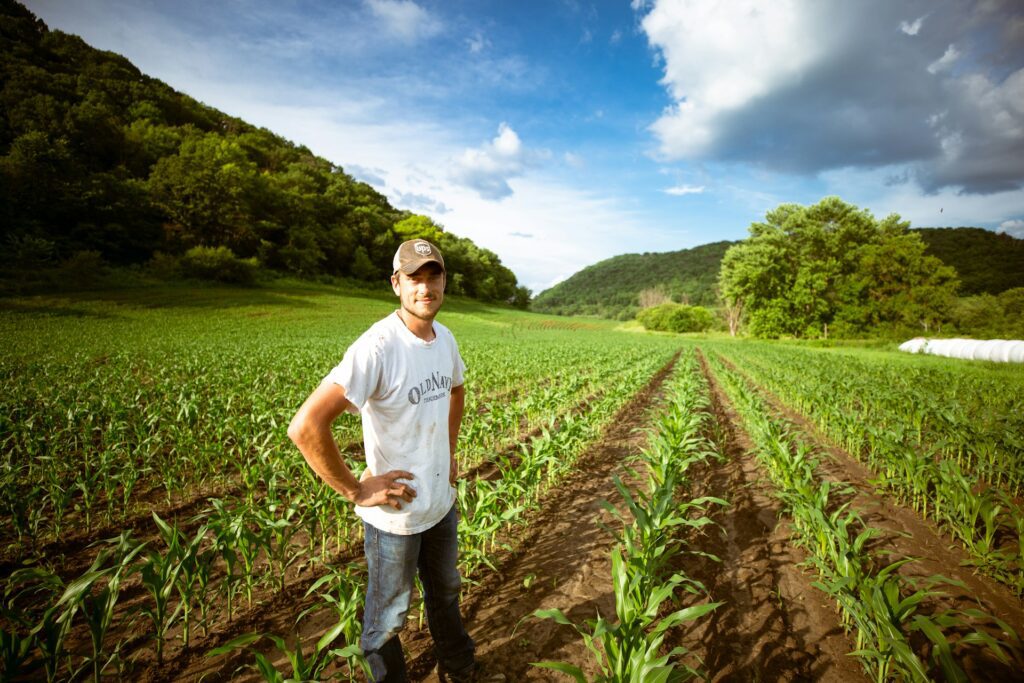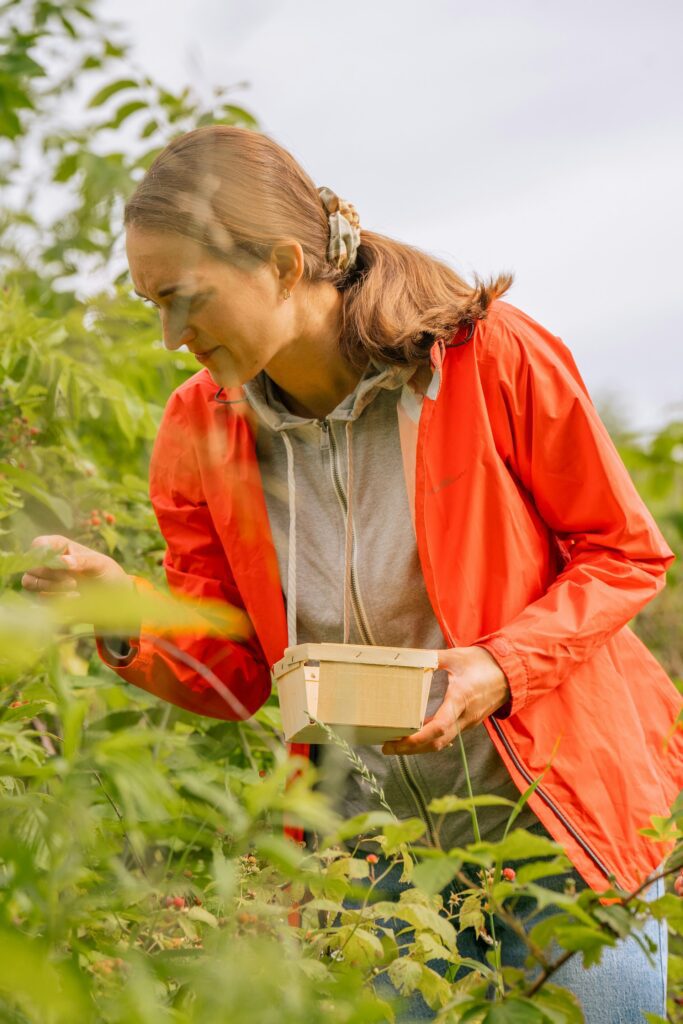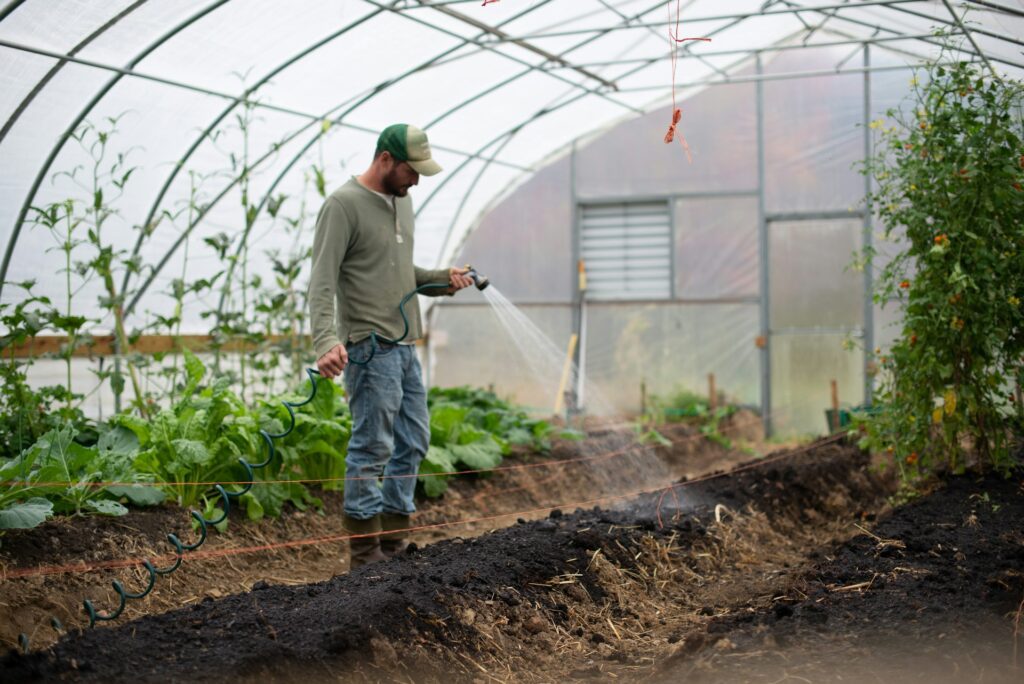To maintain the UK’s food supply and the prosperity of rural communities, farm jobs are essential. The core functions of Britain’s agricultural sector include growing and harvesting crops, tending to livestock, and maintaining machinery. Farm work, whether on large commercial operations or small family farms, is physically taxing, hands-on, and closely tied to the seasons and environment. Many people find that working on farms offers more than just a job; it gives them a sense of purpose, the opportunity to work directly on something meaningful, and fresh air. Many people are drawn to these positions, including seasonal migrants, local labourers, gap-year students, and those who are just seeking a more rural way of life. The UK farming industry continues to offer opportunities for both professional and entry-level workers, driven by the increasing demand for locally sourced and sustainably produced food.
Read Also:Plumbing Jobs in the UK- Everything You Need to Know
What Do Farmers Do?
 A farmer’s daily tasks will differ based on the size of the farm and whether they are raising livestock or crops. Some farmers produce raw materials for textiles or products, like cotton, while others raise livestock and grow food. A farmer’s work may involve planting fruits and vegetables, managing and rotating the soil, harvesting crops, using heavy machinery, and caring for animals, depending on the industry. These are a few typical responsibilities:
A farmer’s daily tasks will differ based on the size of the farm and whether they are raising livestock or crops. Some farmers produce raw materials for textiles or products, like cotton, while others raise livestock and grow food. A farmer’s work may involve planting fruits and vegetables, managing and rotating the soil, harvesting crops, using heavy machinery, and caring for animals, depending on the industry. These are a few typical responsibilities:
- Plant and harvest crops.
- Provide for and feed animals.
- Sell livestock and crops at the market.
- Keep equipment and land in good working order.
- Keep abreast with all rules and regulations about farming.
- Monitor accounting procedures, such as sales, payroll, expenses, and revenue.
Read Also: Warehouse Jobs in the UK- Everything You Need To Know
5 Top Types of Farm Jobs in the UK
 Depending on a person’s profession, region, or farm type, farm jobs in the UK can take many different forms. People may find the farming industry intriguing because it may accommodate a wide range of personalities and may not always call for formal education. Working on a farm may be very solitary due to the long hours, early starts, late finishes, and weekend work. People must be dedicated, devoted, and enthusiastic about agriculture before proceeding into farm jobs.
Depending on a person’s profession, region, or farm type, farm jobs in the UK can take many different forms. People may find the farming industry intriguing because it may accommodate a wide range of personalities and may not always call for formal education. Working on a farm may be very solitary due to the long hours, early starts, late finishes, and weekend work. People must be dedicated, devoted, and enthusiastic about agriculture before proceeding into farm jobs.
Arable Farming
This is the production of crops, which in the UK can include grains like wheat, barley, and oats. These could be pulse crops, which include rape, kale, cabbage, beans, and peas, or they could be root vegetables, like potatoes. The UK also has fruit farms that grow grapes, apples, and pears. Other characteristics of certain arable farms include the production of hay for animal feed. Different regions may grow different crops depending on the soil type, weather, air, water, and other environmental conditions.
Livestock and pastoral farming
In the UK, the majority of agricultural output comes from livestock farming. Generally, it encompasses any farm that produces meat, eggs, milk, or wool. Sheep farms, cattle farms, dairy farms, and pig farms are the different categories of livestock farms. Depending on the sort of farm seeking employment, jobs on UK farms can vary. For example, a dairy farm might prefer applicants with milking expertise over those who have solely worked in arable agriculture.
Worker or Labourer on the Farm
Being proactive and accustomed to working outdoors in all types of weather conditions. Having both local knowledge and practical experience could increase your chances of getting a job as a farm laborer. Generally speaking, a typical list of duties for a farm worker position could be as follows, though they could vary greatly depending on the situation:
- Working with animals (feeding, mucking out, bedding down, transporting or moving, milking, hand rearing, tending to sick or injured animals, tending to newborn animals, etc.).
- Ploughing or preparing fields; planting, fertilising, spraying, and harvesting crops.
- Using and maintaining farm equipment.
- Cleaning and maintaining farm buildings.
- Maintaining field and farm perimeters (ditches, hedges, fences, etc.).
Accommodations may be provided to certain farm workers as part of their job duties. This might only be temporary, as during lambing season, and could rely on the type of work they are engaged in.
Farm Manager
As a farm manager, one might anticipate being in charge of maximising the farm’s yield for any kind of farm. This might even apply to the entire production of crops, dairy products, or animals. A farm manager must adhere to the guidelines established by DEFRA, the Department for Environment, Food, and Rural Affairs. Furthermore, the farm manager would be in charge of:
- Organising and carrying out farm finances, including budget control and farm production.
- Practical duties like operating farm equipment, tending to livestock, fertilising crops, and so on.
- Marketing agricultural goods.
- Purchasing goods.
- Allocating funds and hiring temporary workers.
- Managing diseases and pests, Weather forecasting and preparation for inclement weather, Safety and health Animal welfare.
- preparing goods for markets or auctions, and keeping track of finances
Stockholder/Herdsperson
An individual in this position may be in charge of one or more farm animal species. Sheep, pigs, or cows/cattle could be examples. On the farm, the herdsperson must be able to feed, clean, and generally ensure the welfare of these animals. The quantity of livestock may differ depending on the size of the farm. A trustworthy herdsperson will establish a close relationship with their herd to detect any issues that could affect the herd’s overall health or well-being. The duties may vary from day to day and may involve caring for animals that are pregnant and their offspring.
Read Also: Highest Paying Jobs in the UK 2025
What Credentials are Required to Work on a Farm?
 Many farm occupations depend more on experience, practical abilities, and a willingness to learn than they do on formal qualifications. Certain positions, like Farm Manager, may call for credentials in agriculture or similar disciplines. In particular, for positions like Farm Labourer, where on-the-job training is offered, many farms are open to hiring people with no prior experience. Having a strong work ethic and a passion for agriculture will greatly improve your chances.
Many farm occupations depend more on experience, practical abilities, and a willingness to learn than they do on formal qualifications. Certain positions, like Farm Manager, may call for credentials in agriculture or similar disciplines. In particular, for positions like Farm Labourer, where on-the-job training is offered, many farms are open to hiring people with no prior experience. Having a strong work ethic and a passion for agriculture will greatly improve your chances.
How to Get Farm Jobs in the UK
If you want to work as a farmer, follow these eight steps:
-
Examine various farming professions
Investigating the different farming occupations that are available is the first step towards becoming a farmer. Large amounts of food, food products, raw resources, or livestock are provided to people throughout the nation by certain individuals who own commercial farms. Others manage small farms and concentrate on catering to a particular community or market niche. A beekeeper, microfarmer, or urban farmer, for instance, might concentrate on producing items for the residents of a certain neighbourhood.
Some people choose to operate a farm that depends heavily on community engagement and involvement. Fruit-picking farms and vineyards, for instance, frequently host events and charge entry. Investigate the number of farms in your region. Attending seminars on first-generation farming or searching online for useful job information are other options. This first study might assist you in determining your interests and reducing your possibilities.
-
Speak with those who are employed in the farming industry.
After researching the different kinds of farms that are accessible, you will probably have a short list of farming-related career options that you are interested in. Determine who in the farming industry you should talk to by using this list. Seek out individuals who now operate pick-your-own farms, vineyards, or urban farms if they are the business models that most interest you. When you go to your local farmer’s market, you might ask a few informal enquiries or phone a farming company to arrange an informational interview. To obtain important information for your career planning, be sure to enquire about the farmer’s daily schedule, expectations, when they began, and whether they are content with their work.
-
Apply for an entry-level position.
The next step is to apply for an entry-level position, regardless of how many jobs you have narrowed down to. You can decide if farming is the best career route for you by having agricultural experience before making significant life adjustments or making huge financial investments. Additionally, your entry-level work can help you build your abilities, locate a mentor, make professional contacts, and possibly land a mid-level agricultural job.
-
Learn about farming
There are no specific educational requirements for professional farmers. However, obtaining an associate’s or bachelor’s degree in agricultural sciences, farm business, sustainability, or botany may be beneficial if you want to manage or operate your farm. You can better grasp the complexities of farming and the financial and economic sides of managing a farm with a degree in business or science. It’s crucial to spend time learning about farming, how to use tools and equipment, and what to anticipate from this line of work. You can learn more about farming during or after your two- or four-year degree program by reading books, going to seminars or certification classes, and doing internet research.
-
Organize yourself
Make a business model and a company strategy that formally accounts for expenses, spending, output targets, and projected earnings. Information regarding where you want to start your farm and whether relocation is required should be part of your planning. Maintain a record of your supplier transactions and maintain tabs on all of your earnings and outlays.
-
Invest in your equipment
To begin a farming business, you’ll need certain tools, machinery, and equipment. The equipment you’ll need to keep your farm running well may now be found and bought thanks to your research, business plan, and financial calculations. For instance, you might require mills, hay balers, harvesters, tractors, and ploughs.
-
Employ an agricultural team.
The final step in getting your new farm ready for business is to hire and train a group of competent workers. Examine the roles that are necessary for the particular farming industry you want to work in. Numerous full-time and part-time positions will probably need to be filled by you.
Read Also: Unskilled Jobs Visa Sponsorship UK 2025
Skills required for a farming job
These are the six abilities required for a prosperous farming job:
-
Gritty and persistent
Grit and tenacity are terms used to characterise an individual’s capacity for perseverance and problem-solving. It takes a lot of time and effort to begin a career in farm management because it is physically demanding.
-
Administration of the business:
Company activities, objectives, and procedures must be coordinated as part of company management. Being a farm owner or manager necessitates having a solid grasp of entrepreneurship, business ethics, and mathematics.
-
Time management and organization
These terms describe a person’s capacity to make the most efficient use of their time, space, and energy. These abilities are essential for managing a farm since some chores need to be finished in a set amount of time to prevent produce or goods from being wasted.
-
Understanding of earth science
Maintaining land, water, and other natural resources is the practice and study of sustainability, while earth science is the study of the planet and its chemical and physical composition. For a farmer, these guidelines are essential to the functioning of
-
The capacity to run large machinery
Heavy machinery is used in many farming-related sectors. Knowing how to run, maintain, and fix this machinery is crucial for farm managers and owners.
-
Excellent judgment
Strong judgment entails extraordinary foresight and sound decision-making skills. You will be in charge of hiring employees, scheduling, and selecting suppliers and supplies as a farm owner or business manager. You must have good judgment if you want to succeed in these fields.
Read Also: Private Medical Insurance in the UK
Tips on How to Apply for Farm Jobs
Applying for work on farms can be different than applying for jobs in other industries. Here are some specific pointers to help you make a good impression and improve your chances of getting a farm job in the UK.
-
Research on the UK Farming Industry
Know the differences between arable, pastoral, and mixed farming before applying, and decide which one best fits your interests and skill set. Be aware that farm labor is seasonal and that this influences the requirement for employment. This information can help determine which roles to apply for and when to apply for the role.
-
Make Your CV Stand Out
Add any relevant skills or experiences, such as working outdoors, operating machinery, or caring for animals, even if you haven’t held a farm job. Reliable, diligent people are sought after by farms, so you will have to add that to your CV. Also, emphasize qualities like perseverance, flexibility, and a strong work ethic. Provide any pertinent credentials, such as those in animal husbandry, first aid, or operating machinery.
-
Get ready for the interview
Be ready to talk about or show off your real-world farming abilities. Take the initiative to educate yourself about the philosophy, operations, and products of the particular farm. It is pertinent to note that formal attire may not be a requirement for farm job interviews. However, it does demonstrate professionalism to wear tidy, functional clothing during interviews.
-
Leverage Networking Agricultural Shows and Events
These provide an excellent chance to network with farmers and industry professionals, as well as to show your interest in farm work. Use social media and forums to interact with online agricultural communities to find possibilities and learn from seasoned workers.
-
Employing Recruitment Experts
They can connect you with appropriate farm jobs and offer helpful guidance on your resume and application. Also, Certain job boards like agricultural and farming-related job boards and websites can connect you to openings that may not be available elsewhere.
-
Be a Dedicated Intern or Volunteer
Volunteering and internships are excellent ways to build experience for your resume and show that you value a farming career. Show that you’re open to picking up new skills and changing with the times. Since the agriculture sector is always changing, it might be very beneficial to demonstrate your willingness to stay current. Also, reiterate your interest in the role and thank the employer for the opportunity in a thank-you email. This can help others remember you.
Read Also: Leave to Remain in the UK
Salary for Farm Jobs
Numerous factors, such as where you reside, the items you produce, and the size of your farm, might affect the average farmer’s pay. £51,064 is the average yearly compensation for farm managers.
Conclusion
In the UK, farm jobs continue to play a crucial role in the country’s economy, food supply, and rural culture. Despite not usually receiving much attention, these functions serve as the backbone of everything from farmers’ markets to grocery stores. Working on farms gives people the opportunity to develop useful skills, get in touch with nature, and be a part of an industry that is essential to feeding the nation, whether it is collecting seasonal fruit, caring for cattle, or operating contemporary agricultural equipment. As concerns about sustainability, food security, and ethical farming methods grow, there is a constant need for committed farm labourers, both domestically and abroad. UK farm jobs give anyone seeking practical, fulfilling work the chance to have a significant, long-lasting influence.





